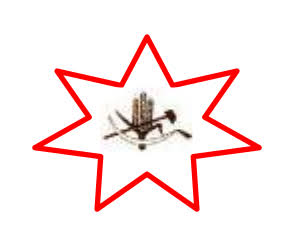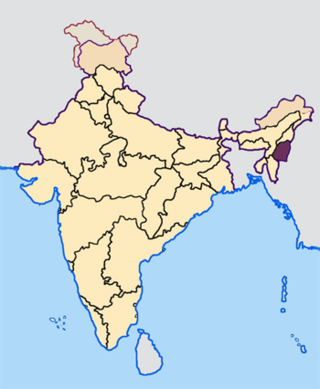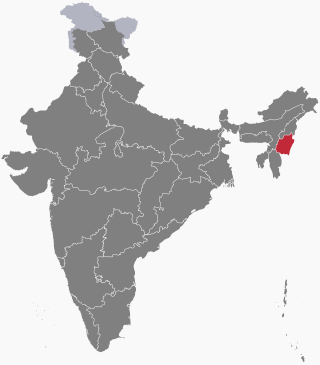
Manipur is a state in northeast India, with the city of Imphal as its capital. It is bounded by the Indian states of Nagaland to the north, Mizoram to the south and Assam to the west. It also borders two regions of Myanmar, Sagaing Region to the east and Chin State to the south. The state covers an area of 22,327 km2 (8,621 sq mi). The official and most widely spoken language is the Meitei language. Native to the Meitei people, it is also used as a lingua franca by smaller communities, who speak a variety of other Tibeto-Burman languages. Manipur has been at the crossroads of Asian economic and cultural exchange for more than 2,500 years. This exchange connects the Indian subcontinent and Central Asia to Southeast Asia, East Asia, Siberia, regions in the Arctic, Micronesia and Polynesia enabling migration of people, cultures and religions.

The Insurgency in Northeast India involves multiple separatist militant groups operating in some of India's northeastern states, which are connected to the rest of India by the Siliguri Corridor, a strip of land as narrow as 14.29 miles (23.00 km) wide.

The United National Liberation Front (UNLF), also known as the United National Liberation Front of Manipur, is a separatist insurgent group active in the state of Manipur in Northeast India which aims at establishing a sovereign and socialist Manipur.

The People's Revolutionary Party of Kangleipak (PREPAK) is an armed insurgent group in Manipur demanding a separate and independent homeland. PREPAK was formed under the leadership of R. K. Tulachandra in 1977.

Imphal Free Press is an English-language daily published in Manipur, India. Alongside the Sangai Express, it is one of the two most widely read newspapers of Manipur. It is considered as one of the "good quality" newspapers, among approximately 40 papers in the state of Manipur.

The National Socialist Council of Nagaland (NSCN) is a Naga militant and separatist group operating mainly in northeastern part of India, with minor activities in northwest Myanmar (Burma). The main aim of the organisation is allegedly to establish a sovereign Naga state, "Nagalim", which would consist of all the areas inhabited by Naga tribes in Northeast India and northwest Myanmar. India claims that China and Pakistan provide financial support and weaponry to the NSCN. Drug trafficking and extortion are believed to be other major sources of income for the NSCN.
Thounaojam Shyamkumar Singh is a politician from Manipur, India. He was minister of forest, horticulture, soil conservation and the department of municipal administration, housing & urban development (2017-2020) in the Biren Singh-led coalition government.

The All Tripura Tiger Force (ATTF) was a Tripuri nationalist militant group active in India's Tripura State. It was founded on 11 July 1990, by a group of former Tripura National Volunteer members under the leadership of Ranjit Debbarma. The ATTF is considered a terrorist organisation by India. According to the South Asian Terrorism Portal, approximately 90% of the ATTF's administration are Hindu and the rest are Christians. The group was said to have been formed as the armed wing of the National Liberation Front of Tripura (NLFT) but split into its own organization. The group was headquartered in Tarabon in Bangladesh.

In the 2008 Imphal bombings, at least 17 people were killed and more than 30 were injured on 21 October 2008.

The People's Liberation Army of Manipur, often shortened to the People's Liberation Army, is a militant group fighting for the creation of an independent and socialist Manipur, a state in northeastern India.

The Zomi Revolutionary Army (ZRA) is an armed Zomi nationalist militant group formed in 1997, following an increase in ethnic tensions between the Kuki people and the Paites tribe in Churachandpur district of Manipur, India. Its parent organisation, the Zomi Re-unification Organisation, was founded in April 1993.
Secession in India typically refers to state secession, which is the withdrawal of one or more states from the Republic of India. Whereas, some have wanted a separate state, union territory or an autonomous administrative division within India. Many separatist movements exist with thousands of members, however, some have low local support and high voter participation in democratic elections. However, at the same time, demanding separate statehood within under the administration of Indian union from an existing state can lead to criminal charges under secession law in India. India is described as an ‘Union of States’ in Article 1 of the Indian constitution I.e "Indestructible nation of destructible states" by its father of constitution Dr. Bhimrao Ramji Ambedkar where a state or Union territory of India cannot secede from India by any means and the Central Government has more powers than the respective state governments and can forcefully change the names and boundaries of the states without their permission at any time when needed for self interest and for the maintenance of integrity.

Human rights abuse is an ongoing insurgency in Manipur, a northeastern Indian state. The issue started in the 1960s due to a separatist conflict. The Indian army, paramilitary, and police personnel are responsible for killings and torture within Manipur. Human rights violations by Indian security forces are said to have fueled the armed opposition groups in Manipur. Insurgent groups have kidnapped children to train them as child soldiers against the Indian government. Manipur was declared a “disturbed area” by the Indian government in 1980 in the Armed Forces Special Powers Act of 1958.

Kangleipak Communist Party is a Maoist militant group in Manipur, India. Named after Kangleipak, the ancient name of Manipur, it was initially led by the communist ideologues — Ibohanbi and Ibopishak. The Kangleipak Communist Party (KCP) had been engaged in an armed conflict separatist insurgency in Manipur against the government of India.

The Maoist Communist Party of Manipur is a Maoist political party in Manipur which aims "to establish a communist society through armed revolutionary war." The Maoist Communist Party of Manipur also intends at liberating the people of Manipur from whom they view as "colonial India."

The Insurgency in Manipur is an ongoing armed conflict between India and a number of separatist rebel groups, taking place in the state of Manipur. The Insurgency in Manipur is part of the wider Insurgency in Northeast India; it displays elements of a national liberation war as well as an ethnic conflict.

Shangwang Shangyung Khaplang was a Burmese leader of Naga ethnicity. He was the leader of the NSCN-K, an insurgent group that operates to establish a Greater Nagaland, a sovereign state bringing all Naga-inhabited areas of Myanmar and India under one administrative setup.
The People's Democratic Council of Karbi Longri (PDCK) was an armed militant outfit which sought to obtain sovereignty of the Karbis.














